Des O’Connor, singer and entertainer who was on the nation’s television screens for 60 years – obituary
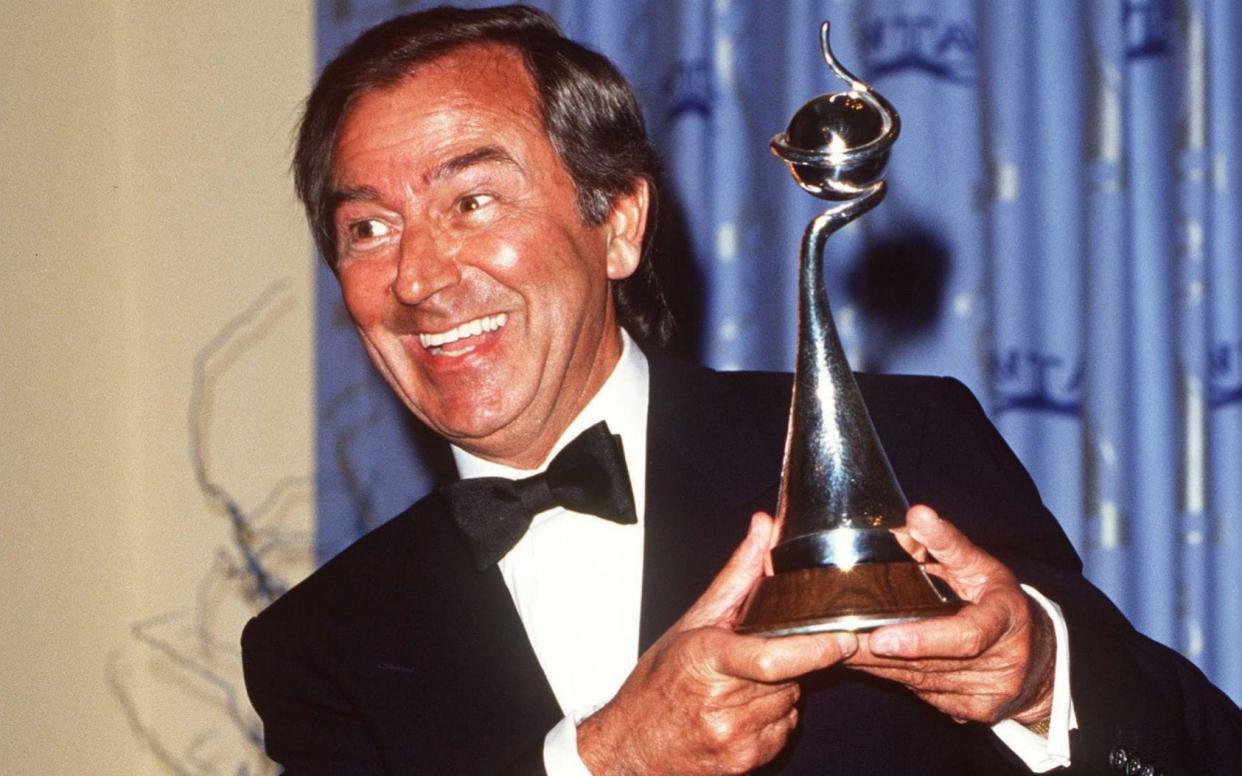
- Oops!Something went wrong.Please try again later.
Des O’Connor, the singer, entertainer and talk show host who has died aged 88, became the highest-paid presenter on television despite being a figure of fun for decades.
O’Connor started out in the 1950s as a Red Coat at a Butlin’s holiday camp. His irrepressibly bubbly personality soon gained him a following, and in 1963 he was given his own television variety show. Though his looks were more homely than matinee idol they won him a female fan club, and he went on to carve a niche as a crooner in the style of Dean Martin, hitting the No 1 spot in the UK charts in 1968 with I Pretend. He became the only solo artist to have starred at the London Palladium more than 1,000 times, and as a singer he sold more than 16 million albums worldwide.
Though his chart career largely came to an end in the early 1970s, his career in television flourished. Des O’Connor Tonight, a celebrity chat show launched on BBC Two in 1977 was so successful that it continued, intermittently, in more or less the same format (latterly on ITV) for a quarter of a century.
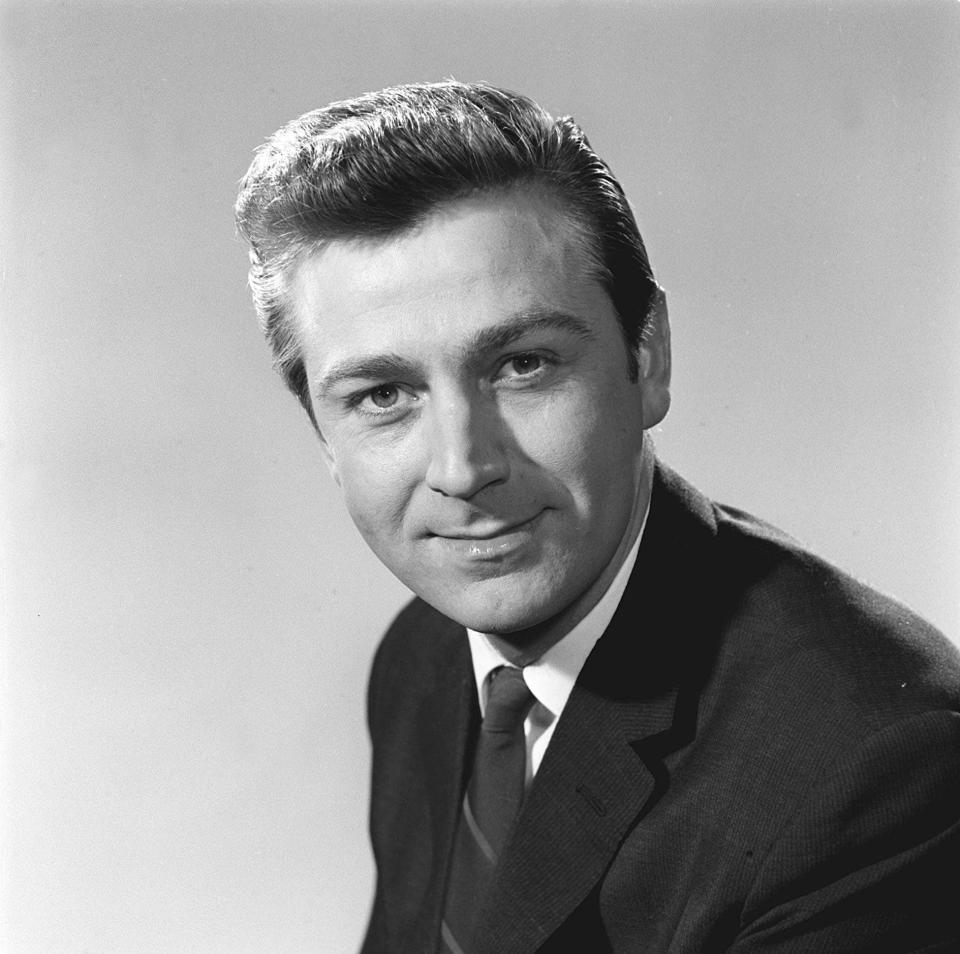
O’Connor’s enduring appeal baffled the more highbrow critics for, as one unkindly observed “the plain truth is that, despite possessing no apparent shred of talent for comedy, singing or conversation, he is a great success as a comedian, singer and conversationalist.”
His unabashed cheesiness and questionable vocal talent famously made O’Connor the butt of jokes from Morecambe and Wise: Ernie once told Eric that he had just finished a play about an old man in his eighties who had lost everything. He’d lost his voice, his dignity all gone. And Eric said: ‘Great, but will Des do it?”
Everybody enjoyed poking fun at O’Connor: a commercial of the 1980s featured Russ Abbot as a fisherman who starts playing a Des O’Connor record and lowers the speaker into the water – whereupon the terrified fish leap into his waiting net.
Some found such jokes uncomfortable because they seemed to mock real failings: Kenneth Williams wrote in his diary that the “endless denigration of this singer would only have been funny if he’d been a good singer.” Yet they never failed to raise a laugh.
To many people, O’Connor’s success as a chat show host was almost as mysterious. He remained impervious to fashion – sartorial or cultural – habitually appearing on screen in a Seventies-style blue double-breasted suit and sporting the kind of permatan and stiff coiffeur normally associated with bank robbers on the Costa del Sol.
While rivals such as Bob Monkhouse and Michael Parkinson either adapted their routines or sunk beneath the new cultural forces of irony and scepticism, O’Connor sailed on, and Des O’Connor Tonight remained one of the most popular shows on television.
The secret of his success may have been that, like an interviewer for Hello magazine, O’Connor provided the easy prompts which allowed his celebrity guests to wear whatever self-image they had chosen and plug their merchandise without fear of snide asides or interruption. The show attracted a list of luminaries and launched the careers of numerous hopefuls including Frank Skinner, Lee Evans, Alan Davies, Lily Savage and Jeff Green.
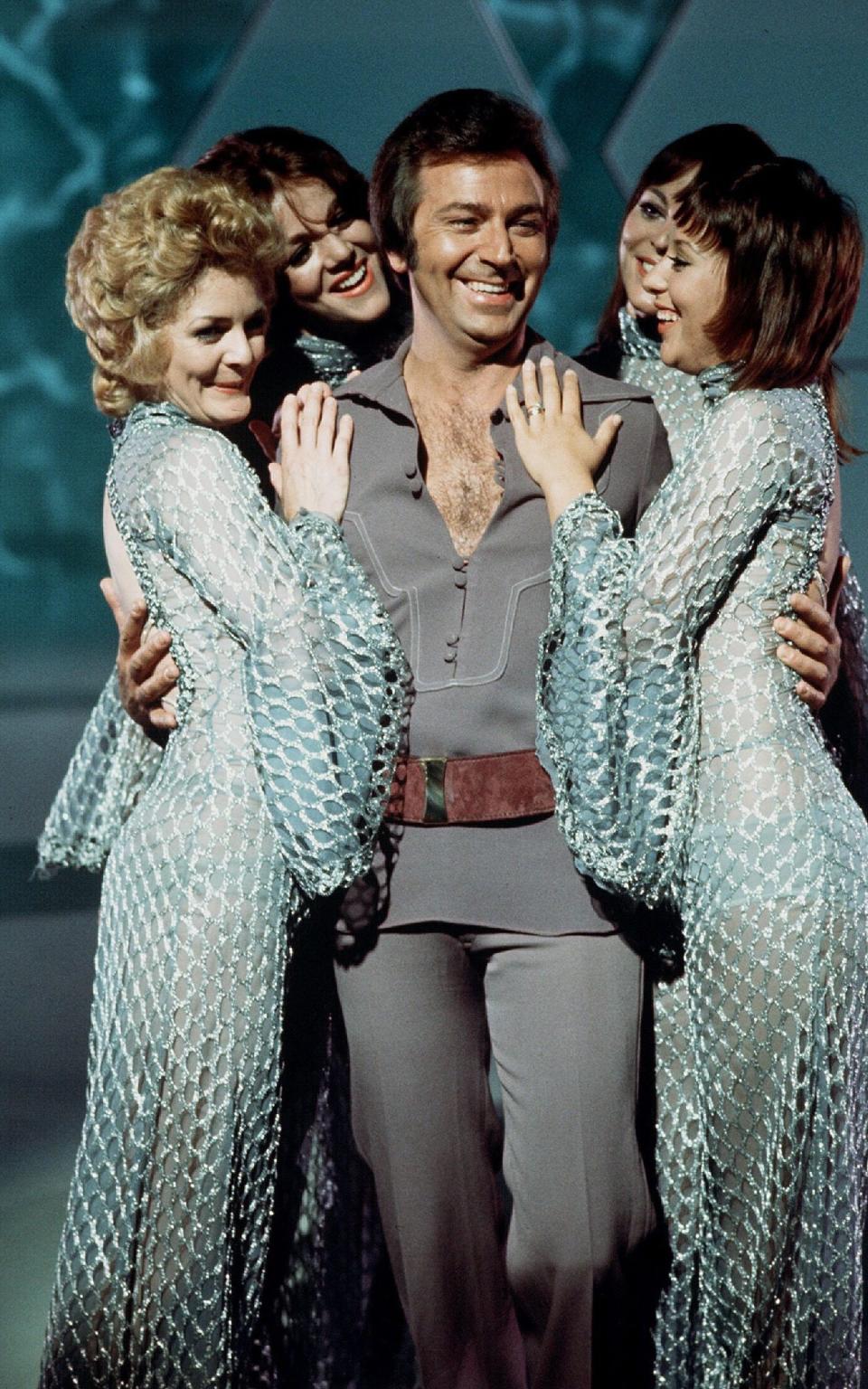
It became the chat show of choice for politicians. A beleaguered William Hague appeared in one summer special (“Do you have a funniest moment?” asked O’Connor). Tony Blair told him that, as Prime Minister, “You get to meet a lot of exciting people, and do a lot of exciting things.” Later, O’Connor’s name appeared on the list of guests at Chequers, prompting the Daily Mail headline: “Why should WE pay for Des O’Connor’s dinner?”
O’Connor claimed to take criticism in good part, even appearing on The Morecambe and Wise Show in a sketch that mocked him. Eric Morecambe, he once confessed, “made out I was a terrible entertainer and I was really worried the jokes would do me damage and ruin my career. But I’ve kept selling records, kept selling out theatres and being on the television. I’m happy with the way it’s kept going.” The jokes “did hurt, but only because we sometimes take ourselves too seriously. I’ve since laughed it off.”
Desmond Bernard O’Connor was born on January 12 1932 in Stepney, London. His father was a dustman and his mother a cleaner. For the first five years of his life young Des suffered from rickets and relied on callipers to get about. Then, a few months after he had taken his first steps without them, he was run down by a car that mounted the pavement. He spent the next six months in hospital in an iron lung.
No sooner had he been discharged from hospital than his home was destroyed in the Blitz, forcing his separation from his family when he was evacuated to Northampton. He briefly played professional football for Northampton Town and also trained as a jockey, although he soon gave it up and worked in a shoe factory.
It was while he was doing his National Service in the RAF that O’Connor began to think of a career in showbusiness. He was caught mimicking his CO; his punishment was to enter a talent contest. He became a Butlin’s Red Coat in the early 1950s, establishing himself as an all-round family entertainer and compère. He began touring working men’s clubs and hosting variety shows, making his stage debut in 1953 at the Palace Theatre in Newcastle.
It was not all plain sailing. At the Glasgow Empire in 1954, he was heckled so mercilessly he pretended to faint and was carted offstage to the Royal Infirmary. “I was in tears. But I went back and did the second show that night – if I hadn’t, I don’t think I’d be in showbiz today,” he recalled.
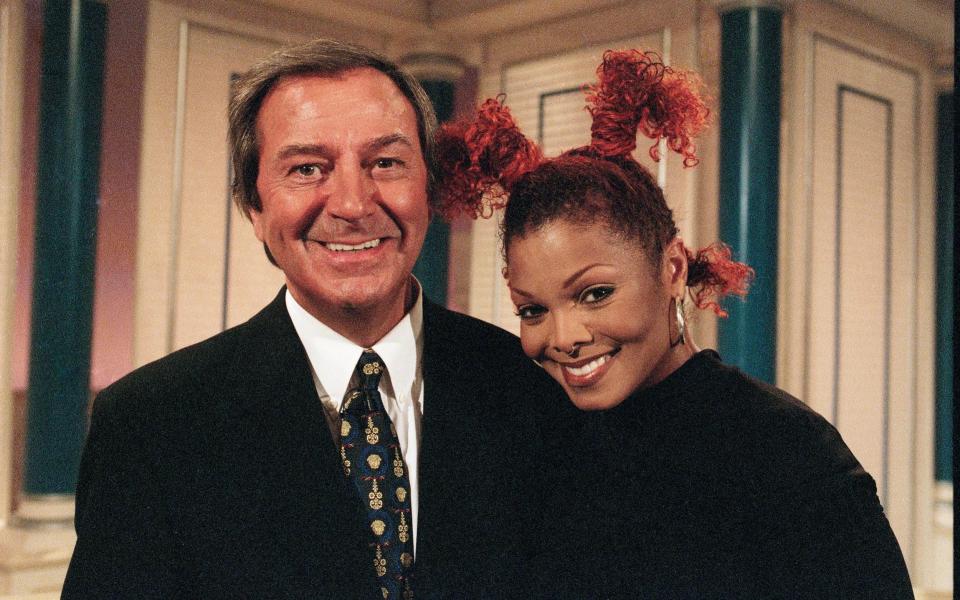
In 1958 he compèred the only British tour of Buddy Holly and the Crickets, having to haul the 6ft 2in Holly out of bed by his feet in the digs they shared to get him to the theatre. The same year, he was brought on to host the television shows Spot That Tune and Sunday Night at the London Palladium.
The Des O’Connor Show, launched in 1963, became a huge hit in Britain and in America, establishing him as a prime-time entertainer. On the back of his television fame he launched his career as a singer and had his first hit single in 1967 with Careless Hands (a cover of a Mel Tormé song).
His second single, I Pretend, went to No 1, selling well more than a million copies. His third single, 1 2 3 O’Leary, became his final Top 10 hit of the 1960s; four more singles made the Top 20, though some, including Dick-A-Dum-Dum and Feelings, later garnered the dubious accolade of featuring in “worst records ever” lists.
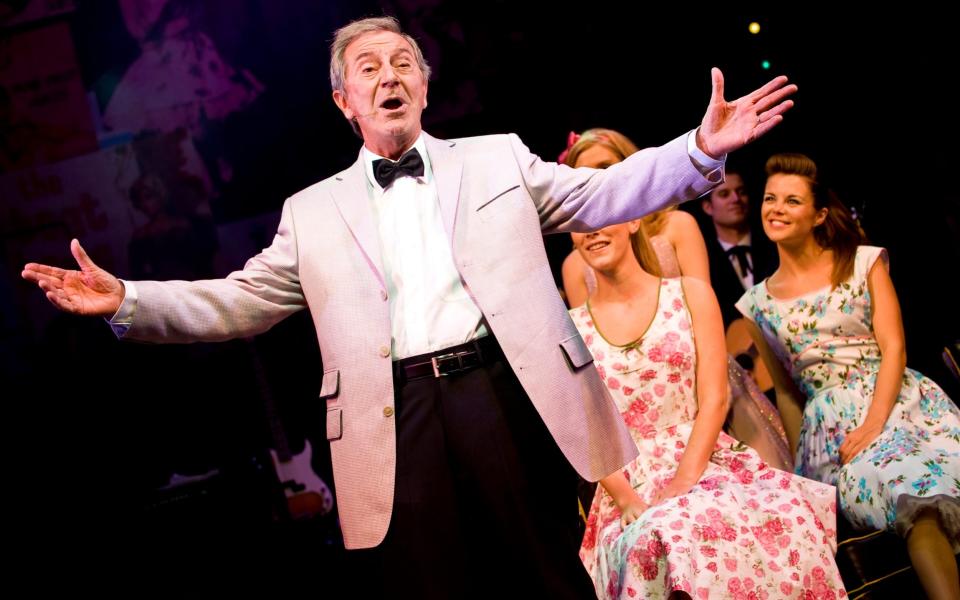
He returned to television in 1974 with Des O’Connor Entertains, a variety show with guest stars, featuring singing, dancing and comedy sketches. A similar format was adapted for Des O’Connor Tonight, which first went on air in 1977 and ran for 24 years.
In the 1990s, O’Connor hosted the game show Take Your Pick and in 2000 he was brought in to present the BBC’s Lottery draw in an attempt to boost flagging ratings; he agreed to a run of six shows at £30,000 each. He returned to ITV in 2002 as co-host with Melanie Sykes of Today With Des & Mel, a live afternoon chat and light entertainment show which won a cult following among university students, giving O’Connor a whole new fan base. In 2003, he signed a new one-year £3.7 million contract with ITV, making him, at 71, Britain’s highest paid television star.
Although ITV axed Today with Des and Mel in 2006 in what the company described as a “painful, but utterly necessary” move, O’Connor was far from finished, and in 2007 he took over from Des Lynam as host of Channel 4’s long-running quiz show Countdown.
In 2011, O’Connor starred in Dreamboats and Petticoats at the Playhouse Theatre in London, and the following year he replaced Russell Grant in the West End musical The Wizard of Oz at the London Palladium, as Professor Marvel. He later he toured a two-man show with Jimmy Tarbuck, as well as his own one-man show.
O’Connor, whose autobiography Bananas Can’t Fly was published in 2001, and who was appointed CBE in 2008, led a private life almost as active as his showbusiness career. He was married four times, first to the beauty queen Phyllis Gill, with whom he had a daughter; secondly to the dancer Gillian Vaughan, with whom he had two more daughters; and, thirdly, to the Swiss model Jay Rufer, with whom he had another daughter.
In 2004, aged 72, he became a father for the fifth time, having a son with his 33-year-old girlfriend, the singer-songwriter Jodie Brooke Wilson, who he married in 2007; she survives him along with his children. He claimed to be on good terms with all his children and former wives, explaining that the “third party” in his relationships had always been work.
Des O’Connor, born January 12 1932, died November 14 2020

